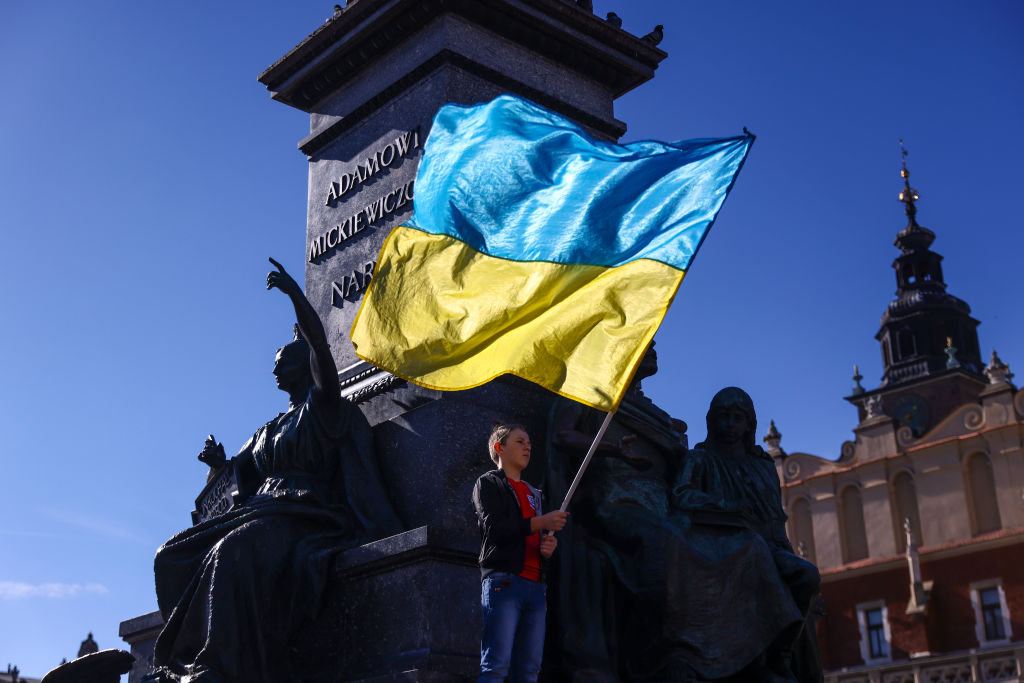
U.S. and Ukrainian officials dismissed Russian President Vladimir Putin’s declaration of a unilateral 36-hour ceasefire over Orthodox Christmas, expressing skepticism about the Kremlin’s true intentions in calling for a temporary truce.
“I found it interesting. He was ready to bomb hospitals and nurseries and churches on the 25th and New Year’s,” President Joe Biden told reporters Thursday at the White House. “I mean, I think he’s trying to find some oxygen.”
Putin’s move comes as Russia has suffered a series of stinging losses in eastern Ukraine and as the White House prepares an aid package that will include several new weapons systems for the first time. The fighting has intensified in recent weeks as the one-year anniversary of Russia’s unprovoked invasion approaches.
Ukrainian officials rejected Putin’s invitation to join the ceasefire as a ploy to regroup his forces and strategize for another offensive. Mykhailo Podolyak, advisor to Ukrainian President Volodymyr Zelensky, called Putin’s ceasefire offer “a cynical trap & an element of propaganda” on Twitter. Amid unexpected setbacks for the Russian military, the invading forces have increasingly hit civilian sites with airstrikes. Hospitals, schools and apartment buildings have been destroyed by a daily bombardment around the country.
Read More: 2022 Person of the Year: Volodymyr Zelensky.
Putin publicly announced Thursday that his forces would engage in a unilateral ceasefire in Ukraine beginning on Friday at noon. It would remain in place until midnight Saturday so troops and civilians could attend church services, he said. Putin said he made the decision after an appeal from the head of the Russian Orthodox Church, and sought Ukraine’s assurances that its forces would reciprocate.
“Proceeding from the fact that a large number of citizens professing Orthodoxy live in the areas of hostilities, we call on the Ukrainian side to declare a ceasefire and allow them to attend services on Christmas Eve, as well as on Christmas Day,” Putin said in a statement.
On Sunday, a deadly missile attack on military barracks in the Russian-occupied city of Makiyivka killed at least 89 Russian service members, making it the highest single casualty event that Moscow has disclosed since the war began last February. The Ukrainians allege the attack may have killed hundreds.
The strike came via American-made HIMARS rockets, which the U.S. first provided Kyiv back in June. The satellite-guided rockets, with a range of roughly 50 miles, provide about twice the range of the artillery that Ukrainian forces were previously using.
The White House confirmed Thursday that a new military aid package is being prepared for Ukraine and will include armored Bradley Fighting Vehicles for the first time. The hulking vehicles carry a crew of three and are armed with an autocannon, a machine gun, and a missile system that can destroy armored targets, such as tanks, from more than two miles away.
Read More: Ukraine’s Winter Offensive Could Decide the War.
The announcement came after phone call between Biden and German Chancellor Olaf Scholz, who said his nation will send Ukraine infantry fighting vehicles and air defense systems. Earlier, France revealed its plans to provide Ukraine with AMX-10 RC armored fighting vehicles. The influx of aid marks a decisive moment in the West’s military support for Ukraine. While several countries have sent Soviet-era tanks to Ukraine, there has been a reluctance to send modern armored systems and provide intensive training to operate them.
U.S. Defense Department spokesman Brigadier General Pat Ryder told reporters Thursday at the Pentagon that the Bradley vehicle “is not a tank, but it’s a tank-killer” that “will provide a significant boost to Ukraine’s already impressive armor capabilities, and we’re confident that it will aid them on the battlefield.”
The White House and Defense Department plan a more formal announcement about the latest Ukraine aid package on Friday. The U.S. has committed more than $21 billion in security assistance to Ukraine since Russia’s invasion began last February.
More Must-Reads from TIME
- Cybersecurity Experts Are Sounding the Alarm on DOGE
- Meet the 2025 Women of the Year
- The Harsh Truth About Disability Inclusion
- Why Do More Young Adults Have Cancer?
- Colman Domingo Leads With Radical Love
- How to Get Better at Doing Things Alone
- Michelle Zauner Stares Down the Darkness
Write to W.J. Hennigan at william.hennigan@time.com